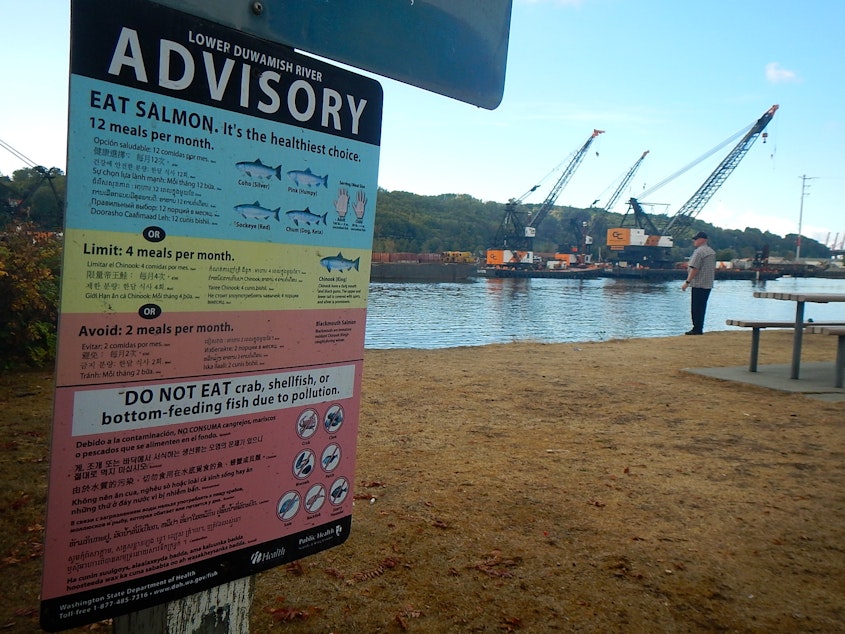Boeing's toxic PCBs ooze into Seattle's Duwamish River

Decades after they were banned, the toxic chemicals known as PCBs keep oozing into Seattle's Duwamish River. Environmental groups say one Boeing facility in Tukwila is sending polychlorinated biphenyls into the river at levels thousands of times beyond the legal limit.
Boeing says the toxic pollution running off the 24 paved acres at its Military Delivery Center, where it finishes jets before handing them off to the Pentagon, is minimal and decreasing.
Puget Soundkeeper and Waste Action Project gave Boeing notice on Monday that they intend to sue over the polluted stormwater running off from the delivery center.
Chris Wilke with Puget Soundkeeper said stormwater-runoff measurements taken by Boeing as recently as January show the runoff had about one part per trillion of the banned and highly toxic chemicals.
"They’re very small numbers, but they were many, many times — even thousands of times — above the legal limit," Wilke said.
Sponsored
Boeing doesn't agree that there's a big problem.
“We dispute that allegation from Puget Soundkeeper that the very low levels of PCBs that we found in stormwater have caused or contributed to any kind of a water quality violation,” Boeing spokesperson Holly Braithwaite said.
The Washington Department of Ecology ordered Boeing to improve its stormwater treatment there last year.
“They had excessive levels of various pollutants including PCBs, zinc and other metals and petroleum,” Department of Ecology spokesperson Larry Altose said.
The company appealed that order to the Washington Pollution Control Hearings Board. A hearing is scheduled for December.
Sponsored
The ABCs of PCBs
If you've ever seen the "don't eat these fish" signs in eight languages along the Duwamish River, then you've witnessed the power and persistence of polychlorinated biphenyls. PCBs are a big reason that the Environmental Protection Agency designated the lower Duwamish River a federal Superfund site for priority cleanup back in 2001. It's also why crabbing and most fishing is prohibited in the river to this day.
"They work their way up the food chain through invertebrates to small fish, to large fish, to top predators like orca whales and seals and people," Wilke said. "If people are eating salmon, then you’re actually a top predator in Puget Sound."
Wilke added: “Even if you put up a sign in eight languages, there are still people eating fish out of the river. We need to recover this river to the point where it’s safe to fish and eat the fish.”
Environmentalists praised Boeing's broader efforts to clean the Duwamish River of decades of PCBs and other old pollution, especially from Boeing Plant 2, which had been one of the most contaminated sites along the river ever since it cranked out nearly 7,000 B-17 bombers in World War II.
Sponsored
The persistent, carcinogenic PCBs were used in things like paint, caulk and electrical equipment.
“They took everything out,” James Rasmussen with the Duwamish River Cleanup Coalition said of the Boeing Plant 2 cleanup. “They did a great job on it.”
But Rasmussen said the gunk running off Boeing's Military Delivery Center in Tukwila could undo the long-term efforts to make the lower Duwamish, a five-mile long Superfund site, safe for swimming and drinking.
“You don’t want to spend $350 million to clean up a river and know within a year or two, it’s going to be recontaminated,” he said.
Rasmussen added: “It’s different silos within Boeing. If Boeing really puts their mind to something, they can really get it done.”
Sponsored
Boeing spokesperson Braithwaite said the company has put in a decade of work to control its toxic runoff from the Military Delivery Center.
"These projects have substantially reduced sources of PCBs at the Military Delivery Center,” Braithwaite said.
She said most samples in recent years have “very low” or undetectable levels of PCBs.
Superfund woes
EPA Administrator Scott Pruitt said he is making Superfund toxic-waste cleanups like the Duwamish a top priority for the agency, without making more funding or staff available. Federal funding for Superfund cleanups has fallen by nearly half since 1999, according to the U.S. Government Accountability Office — even as the number of sites needing cleanup grew.
Sponsored
Rasmussen said budget cuts at the state level also hindered cleanup efforts on the Duwamish. EPA is responsible for the watery portion of the Duwamish cleanup, while the Washington Department of Ecology handles the land.
“But it’s really hard to do the work when they’ve been eviscerated by the legislature,” Rasmussen said.
A federal task force that Pruitt created to recommend ways to accelerate Superfund cleanups reportedly kept no records of its meetings. Albert “Kell” Kelly, a friend of Pruitt’s from Oklahoma with no experience in pollution cleanup and a troubled past in the banking industry, headed that task force.
Kelly, who had issued loans to Pruitt when they were both in Oklahoma, then became head of the Superfund program.
He resigned on Tuesday without explanation.

